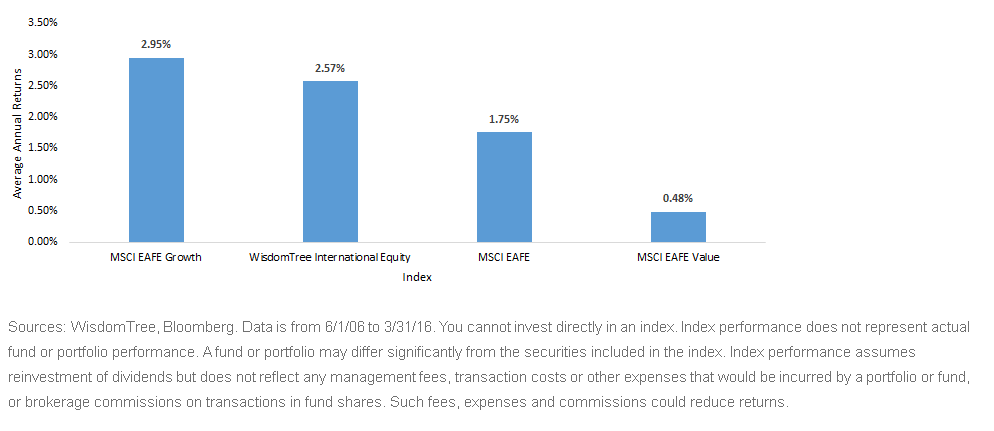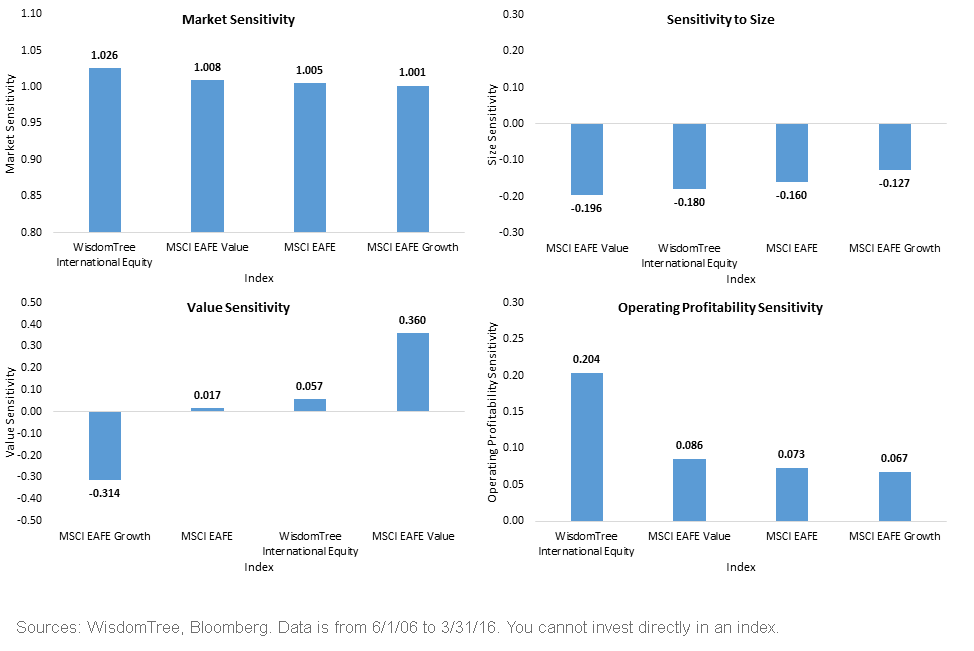The Income Factor in Developed International Equities


 For definitions of indexes in the chart, visit our glossary.
• Just as we saw in the United States over this period, the growth style outperformed the value style within the developed international equity markets. The WisdomTree International Equity Index outperformed both the MSCI EAFE and MSCI EAFE Value Index indexes over this period.
The Developed International Income Factor Introduces Tilts Different from the USA Income Factor
For definitions of indexes in the chart, visit our glossary.
• Just as we saw in the United States over this period, the growth style outperformed the value style within the developed international equity markets. The WisdomTree International Equity Index outperformed both the MSCI EAFE and MSCI EAFE Value Index indexes over this period.
The Developed International Income Factor Introduces Tilts Different from the USA Income Factor
 • The Income Factor Has Greater Market Sensitivity Abroad Than at Home: In the United States, we saw that the WisdomTree Dividend Index, in its execution of the income factor, delivered a market sensitivity below 1.0. The WisdomTree International Equity Index, on the other hand, delivered a market sensitivity of about 1.03. This tells us that, on a relative basis, the WisdomTree International Equity Index could be apt to more fully capture both upward and downward market moves. One reason for this may be that mid-cap and small-cap growth stocks in developed international markets are much more likely to pay dividends, giving the WisdomTree International Equity Index broader coverage compared to the WisdomTree Dividend Index in the United States.
• The Income Factor Has Fewer Large-Cap Tilts Abroad Than at Home: Since a greater proportion of mid-cap and small-cap stocks in developed international markets pay dividends, there tends to be less of a pronounced bias toward large caps in the WisdomTree International Equity Index. We see here that it is fairly in line with both the MSCI EAFE Value and MSCI EAFE indexes.
• The Value Tilt of the Income Factor Melts Away in Developed International Markets: While the U.S.-focused WisdomTree Dividend Index exhibited a clear tilt toward value, the WisdomTree International Equity Index turned out to be closer to a core strategy, not tilting significantly toward either the value or the growth end of the spectrum.
• The Income Factor Tilted toward Robust Operating Profitability in Developed International Markets: The most notable common thread between the WisdomTree Dividend Index and the WisdomTree International Equity Index was the tilt toward robust operating profitability. Taking the same concept of an extremely broad Index of dividend-paying stocks in two non-overlapping equity markets led to this similar result.
WisdomTree’s first dividend-oriented equity Indexes just passed their 10-year anniversary. The WisdomTree International Equity Index, a competitor to the MSCI EAFE Index for long-term, strategic international exposures, shows that dividend weighting was much more than a value-tilted strategy. In a market environment where growth outperformed value by almost 250 basis points per year, this Index outperformed the MSCI EAFE Index.
We believe this was caused by the quality factor tilt. This Index had nearly double the profitability factor exposure of the MSCI EAFE Value Index, largely because the latter just searches for the lowest-priced stocks in a market, with no consideration for quality. Dividends are very commonly associated with attributes of profitability and quality, as firms must have good profits to consistently pay and grow their dividends. These companies that can grow dividends are the ones that receive greater weights in WisdomTree’s Indexes through the annual rebalancing process.
• The Income Factor Has Greater Market Sensitivity Abroad Than at Home: In the United States, we saw that the WisdomTree Dividend Index, in its execution of the income factor, delivered a market sensitivity below 1.0. The WisdomTree International Equity Index, on the other hand, delivered a market sensitivity of about 1.03. This tells us that, on a relative basis, the WisdomTree International Equity Index could be apt to more fully capture both upward and downward market moves. One reason for this may be that mid-cap and small-cap growth stocks in developed international markets are much more likely to pay dividends, giving the WisdomTree International Equity Index broader coverage compared to the WisdomTree Dividend Index in the United States.
• The Income Factor Has Fewer Large-Cap Tilts Abroad Than at Home: Since a greater proportion of mid-cap and small-cap stocks in developed international markets pay dividends, there tends to be less of a pronounced bias toward large caps in the WisdomTree International Equity Index. We see here that it is fairly in line with both the MSCI EAFE Value and MSCI EAFE indexes.
• The Value Tilt of the Income Factor Melts Away in Developed International Markets: While the U.S.-focused WisdomTree Dividend Index exhibited a clear tilt toward value, the WisdomTree International Equity Index turned out to be closer to a core strategy, not tilting significantly toward either the value or the growth end of the spectrum.
• The Income Factor Tilted toward Robust Operating Profitability in Developed International Markets: The most notable common thread between the WisdomTree Dividend Index and the WisdomTree International Equity Index was the tilt toward robust operating profitability. Taking the same concept of an extremely broad Index of dividend-paying stocks in two non-overlapping equity markets led to this similar result.
WisdomTree’s first dividend-oriented equity Indexes just passed their 10-year anniversary. The WisdomTree International Equity Index, a competitor to the MSCI EAFE Index for long-term, strategic international exposures, shows that dividend weighting was much more than a value-tilted strategy. In a market environment where growth outperformed value by almost 250 basis points per year, this Index outperformed the MSCI EAFE Index.
We believe this was caused by the quality factor tilt. This Index had nearly double the profitability factor exposure of the MSCI EAFE Value Index, largely because the latter just searches for the lowest-priced stocks in a market, with no consideration for quality. Dividends are very commonly associated with attributes of profitability and quality, as firms must have good profits to consistently pay and grow their dividends. These companies that can grow dividends are the ones that receive greater weights in WisdomTree’s Indexes through the annual rebalancing process.
Important Risks Related to this Article
Dividends are not guaranteed, and a company currently paying dividends may cease paying dividends at any time.

Christopher Gannatti began at WisdomTree as a Research Analyst in December 2010, working directly with Jeremy Schwartz, CFA®, Director of Research. In January of 2014, he was promoted to Associate Director of Research where he was responsible to lead different groups of analysts and strategists within the broader Research team at WisdomTree. In February of 2018, Christopher was promoted to Head of Research, Europe, where he was based out of WisdomTree’s London office and was responsible for the full WisdomTree research effort within the European market, as well as supporting the UCITs platform globally. In November 2021, Christopher was promoted to Global Head of Research, now responsible for numerous communications on investment strategy globally, particularly in the thematic equity space. Christopher came to WisdomTree from Lord Abbett, where he worked for four and a half years as a Regional Consultant. He received his MBA in Quantitative Finance, Accounting, and Economics from NYU’s Stern School of Business in 2010, and he received his bachelor’s degree from Colgate University in Economics in 2006. Christopher is a holder of the Chartered Financial Analyst Designation.

